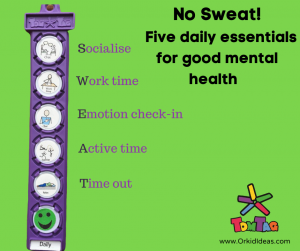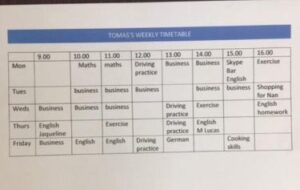
This year’s World Autism Awareness Week takes place against the backdrop of a global pandemic. With a third of the global population under lockdown our daily lives have been dramatically changed. Forced to remain in our houses and adapt to new circumstances, many of us will be feeling bewildered, frustrated and anxious.
Sweating it out!
The anxiety many of us are now experiencing around these unprecedented changes gives us an insight into how many young people with autism, like my son Tom, experience an unwanted change of plan – it’s fraught with worry, it’s out of anything we could have predicted and it’s not what we wanted.
Our ‘new normal’ in these strange and unsettling times is very much how he feels all the time. Imagine having to deal with that level of anxiety every single day!
So, given everyone’s heightened levels of anxiety how can you manage autism and anxiety in a lockdown?
We’d like to share some daily strategies which we are using to support Tom’s mental health during this lockdown period. We’ve called it the SWEAT approach – let’s sweat this one out!

Socialise – maintain social connections
Tom misses his dad, grandparents and college friends. Thankfully technology makes it relatively easy to keep connected. However, just as in normal social situations, we’re careful not to put demands on him to socialise virtually either. We offer him a choice of how he stays connected and how often he wants to have contact.
Work – provide structure and routine

Routines and rituals help establish stability and order for children and young people with autism like Tom.
Like many young people with autism Tom struggles with flexible thinking. That means he finds it difficult to adjust and readjust to changes in his routine and this can cause him anxiety. A useful strategy has been to highlight what has stayed the same and what has changed. This reassures him that even with all the uncertainty some things, like his college work, mealtimes and bedtime routines, remain the same.
Keeping familiar routines going as much as possible is therefore important to provide structure and reassurance. Tom accesses his college work and sessions with his speech therapist, English tutor and German teacher online. A simple written visual schedule shows him what to expect each day and can help navigate these confusing times. You can also create symbol-based home visual schedules quickly and easily with TomTag.
However, it’s important not to set the bar to high! Be mindful that there will be days when the ‘home-schooling’ isn’t done and instead it is just a day of being together. An example of this was during the recent warm weather when we abandoned the schedule and went for a family walk.
Emotions – share worries and concerns

Set aside time each day to talk about worries and concerns. Try to contain your own anxieties around the current situation because this anxiety gets transferred to our children. Now more than ever our autistic children need patience and support from the people they love.
Tom, like all of us, is naturally worried about events and this is amplified by worries about whether he is catching or spreading the disease.
We keep news coverage to a minimum and explain things in a clear and consistent manner using language appropriate to his level of understanding.
Making a wish list, where we write down all the things we want to do after the pandemic has passed, is also working well – though at the moment, it mostly revolves around football and Swiss trains!
Active – encourage physical activities
Keeping active is good for both our physical and mental well being. Tom has a daily fitness programme and he’s set up an exercise challenge with his speech therapist.

Focusing on activities and encouraging him to do some chores – like washing the car and helping his sister deliver essential shopping to his self-isolating grandparents and other vulnerable members of the community – provides positive reinforcement that is so vital to keep up his self-esteem, confidence and sense of purpose.
Time alone – relax with special interests

Build in lots of down time, together with time to indulge special interests. With all the family thrust together it’s important for mental well being that we all carve out some time for ourselves.
It’s a difficult time for all of us particularly for children with autism and anxiety. Hopefully by following these strategies we can sweat out this lockdown period.
What tips can you share that make this lockdown period more manageable and less stressful in your house?
